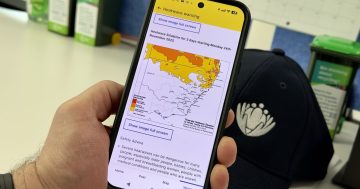Drew Harwell says Google makes more money off its users and gathers more of their data than Facebook, so why is it not also in the privacy spotlight?
By Drew Harwell*

Photo: Edho Pratama
With Facebook chief, Mark Zuckerberg grilled in Washington last week over his company’s data-gathering practices, privacy experts are asking a central question: Who let Google off the hook?
The titan of search, smartphones and web browsing makes more money off its users than Facebook, gathers more of their data and covers parts of their lives Facebook can only dream of.
Google documents show what websites people have looked at, what places they have visited and many (if not all) of their searches, calendars, documents and emails.
But in the privacy firestorm that has grown out of Facebook’s Cambridge Analytica scandal, Google has emerged almost entirely unscathed.
Google executives were originally invited to testify on the use and abuse of data, but the US Senate Committee ultimately decided against pursuing it.
Asked last Monday if he would like to see Google executives testify, Democrat Senator Bill Nelson said: “Absolutely. Because it’s not just Facebook … all these other apps and sites that get your personal data, that’s another way of us losing our privacy.”
Google’s parent company, Alphabet runs the world’s most popular search engine (Google), smartphone operating system (Android), web browser (Chrome), video site (YouTube) and email service (Gmail), giving the company unprecedented detail into its users’ daily lives.
Google and Facebook share a longstanding duopoly that dominates online advertising, and Google shows no signs of slowing.
Sensitive information
“Google really has a much bigger footprint when it comes to tracking and profiling the everyday lives of billions of people,” said Wolfie Christl, a privacy researcher for the non-profit think tank Cracked Labs.
“And it’s often very invasive and very sensitive information.”
Google spokeswoman Andrea Faville said the company allows users to learn what data is collected about them, see how it is used and control how much is shared.
The company’s policies prohibit deceptive behaviour and misuse of personal data, she said.
“If we find evidence of violations we will take action,” Faville said.
People who have downloaded their Facebook data have been surprised to find catalogues of their online relationships, events and messages, as well as which advertisers have their contact information.
But a download of one’s Google trove can be even more exhaustive, including users’ full browsing and search histories and by-the-second data on their physical activities and real-time locations.
Google has so far not been tied to the latest Facebook scandal, however, like Facebook, its massive advertising network was used by Russian sources to spread disinformation during the 2016 US election.
And some of the most recent privacy shocks have sprung forth from loose rules both companies allowed.
Facebook users who downloaded their data from the service last month were surprised to find years-long logs of so-called “metadata” from their text messages and phone calls, including names and phone numbers.
That data gathering was made possible only because Android users had, perhaps unknowingly, agreed to share their call and message details when they installed Facebook’s mobile app.
Better protections
Google has since changed how Android apps ask users’ permission for call and message data, but apps can still access it.
Apple’s iPhone operating system, iOS, has never allowed third-party apps to access call data.
“On the one hand, it seems like Google has simply done a better job of managing the data it has and ensuring privacy protections are in place,” said Brian Wieser, a senior analyst for Pivotal Research Group.
“On the other hand, I think the reason for consumer outrage is because the Cambridge Analytica episode is highlighting consumers’ mostly latent fears around how their data can be used against themselves.”
“In that sense, Google is not much better.”
So why is Facebook the only one in the hot seat?
Scott Steinberg, the co-founder of Data Does Good, says the haphazard public conversation over data privacy is dominated by newsmaking flare-ups.
Google, he says, has more often avoided public criticism simply because they’ve been better at avoiding those kinds of scandals.
“Google should be at the centre of the more holistic conversation about data regulation and ethics,” Steinberg said.
“They have significantly more data … than Facebook, Amazon and [major data broker] Acxiom combined.”
“If the conversation becomes more about policy than about data breaches, which it’s looking likely that it will, I expect that Google will gain more of the spotlight.”
Google’s and Facebook’s advertising businesses depend on gathering as much user data as they can find.
Digital breadcrumbs
But Google holds a major advantage over Facebook because it fleshes out a user’s profile with data from all the sites that person uses.
Instead of just the interactions people would share with their family and friends, Google knows a person’s private searches, travel schedule and YouTube views.
That system of digital breadcrumbs is often why a product someone searched for on one website can end up following them around the internet in ads.
Not always obvious
But the ways in which Google gathers data are not always so obvious.
The company raised privacy worries last year when it said it would begin measuring the real-world performance of its online ads by working with undisclosed companies that had access to 70 per cent of the credit-card and debit-card transactions in the US.
Privacy experts said Google’s data practices and controls are more advanced, more detailed and simpler to use than Facebook’s.
And the search giant makes it easier for users to delete parts of their data from the site.
It is unclear how long Google will be able to stay out of Facebook’s data-privacy shadow.
Experts said Google has one thing going for it: unlike the #DeleteFacebook movement, there’s no easy way to call off the all-encompassing search engine for good.
* Drew Harwell is a technology reporter for The Washington Post. He tweets at @drewharwell and his website is drewharwell.com.
This article first appeared at www.washingtonpost.com.











